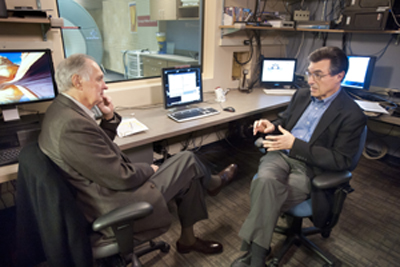Press Release: Carnegie Mellon’s “Mind-Reading” Research To Be Featured on PBS’ “Brains on Trial with Alan Alda”
Contact: Shilo Rea / 412-268-6094 / shilo@cmu.edu
 PITTSBURGH—As brain imaging techniques advance, their potential influence on criminal justice is becoming increasingly evident. An innovative two-part series, “Brains on Trial with Alan Alda,” airing from 10 – 11 p.m., Wednesday Sept. 11 and 18 on PBS, will explore how brain imaging has the growing ability to separate truth from lies — even decoding people’s thoughts, intentions and memories — and may radically affect future judicial proceedings.
PITTSBURGH—As brain imaging techniques advance, their potential influence on criminal justice is becoming increasingly evident. An innovative two-part series, “Brains on Trial with Alan Alda,” airing from 10 – 11 p.m., Wednesday Sept. 11 and 18 on PBS, will explore how brain imaging has the growing ability to separate truth from lies — even decoding people’s thoughts, intentions and memories — and may radically affect future judicial proceedings.
Carnegie Mellon University’s seminal neuroscience research that combines brain imaging with machine-learning techniques to identify a person’s thoughts and emotions will be featured in part two of the series, “Deciding Punishment,” on Sept. 18.
Marcel Just, the D.O. Hebb University Professor of Psychology in the Dietrich College of Humanities and Social Sciences and director of the Center for Cognitive Brain Imaging (CCBI) at CMU, sees brain research playing a role in courtrooms because the judicial process often includes not only what an accused person did, but also what he or she was thinking when they did it.
“Did the perpetrators fear for their life, had they premeditated their actions, did they feel remorse? These are all mental states that are on the verge of being identified via their brain activity signatures, at least at the time when the thought occurs,” Just said. “It remains a major challenge to identify a thought that occurred in the past. When that capability is developed, it will revolutionize forensic science. It will become ‘CSI-fMRI.’ This research opens a new world of possible evidence for assessing a person’s responsibility for their actions,” he said.
“Brains on Trial” centers around the trial of a fictional crime: a robbery staged in a convenience store that has been filmed by the store’s security cameras. As the trial unfolds, Alda visits with leading neuroscientists whose research has begun to influence court decisions. CMU’s Just, Tom Mitchell and Karim Kassam spent a day last spring explaining and demonstrating their “mind reading” research to Alda, specifically how they use functional magnetic resonance imaging (fMRI) and machine learning to measure brain signals to precisely identify a letter a person sees and the emotion a person experiences. Filming took place in CMU’s Scientific Imaging & Brain Research (SIBR) Center, which uses cutting-edge imaging and computing technology in cognitive, developmental and social neuroscience research.
“I learned a shocking thing with Marcel because I really didn’t understand the accuracy with which you can tell what letter a person is reading or what emotion a person is feeling by looking at the pattern of brain activity,” Alda said. “It is just amazing that we’re already at that point in brain science.”
Alda, a seven-time Emmy Award winner, has a longtime interest in promoting a greater public understanding of science. He hosted the award-winning PBS series “Scientific American Frontiers” for 11 years, in which he interviewed scientists from around the world. In 2010, Alda hosted a science series on PBS called “The Human Spark.” In 2006, for his efforts in helping to broaden the public’s understanding of science, he was presented with the National Science Board’s Public Service Award. He is a visiting professor at Stony Brook University’s Alan Alda Center for Communicating Science, where he is helping scientists to communicate more effectively with the public in general and with legislators who influence science funding and policy.
“I was surprised to see how well brain scientists are beginning to piece together what’s going on inside our heads, sometimes before we’re even aware of what’s going on in there ourselves,” Alda said. “As I talked with scientists and jurists on this show, I became convinced that before this new research makes its way into the courts, we need to think about what it could mean to our system of justice.”
Alda has a personal connection to Carnegie Mellon; his grandson, Scott Coffey, is a junior in the School of Drama.
“Brains on Trial” was produced for PBS by the Chedd-Angier Production Company and was funded by the Alfred P. Sloan Foundation and the Cheryl and Philip Milstein Family.
For more than 50 years, Carnegie Mellon researchers have been working to achieve historic breakthroughs in psychology and computational neuroscience to tackle multifaceted problems of human thought, such as how we solve problems, learn mathematics, or make financial decisions — and how these thought processes can be improved. The CMU research also includes a major effort in using brain imaging to understand and treat disorders like autism and dyslexia. To build on its foundation of research excellence in psychology, neuroscience and computational science, CMU recently launched a Brain, Mind and Learning initiative to enhance the university's ability to innovate in both the laboratory and in the world.
For more information on the upcoming PBS series, “Brains on Trial,” visit http://brainsontrial.com/.
Related Articles:
Researchers Identify Emotions Based on Brain Activity
Mind Reading 2.0
###
Pictured above is Alan Alda (left) interviewing CMU's Marcel Just. "I learned a shocking thing with Marcel because I really didn’t understand the accuracy with which you can tell what letter a person is reading or what emotion a person is feeling by looking at the pattern of brain activity," Alda said. "It is just amazing that we’re already at that point in brain science."